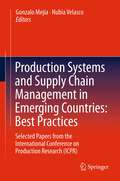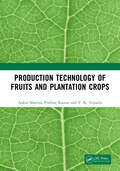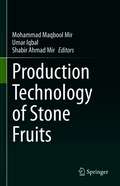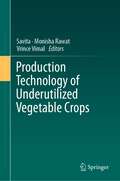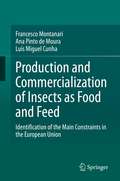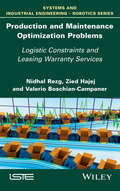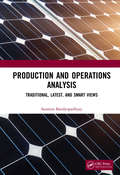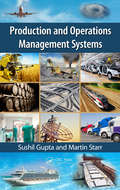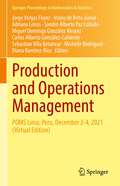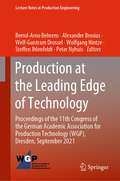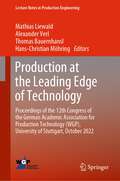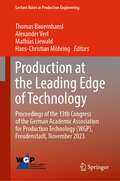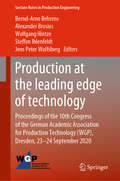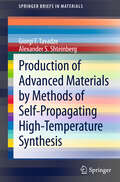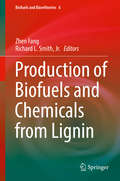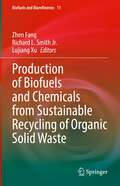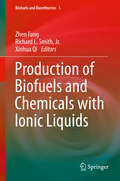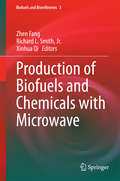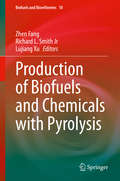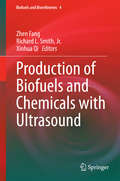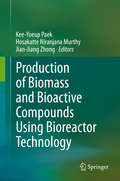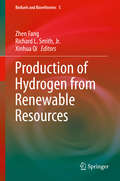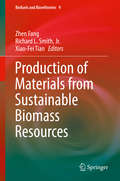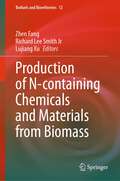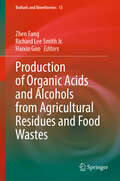- Table View
- List View
Production Systems and Supply Chain Management in Emerging Countries: Selected papers from the International Conference on Production Research (ICPR)
by Nubia Velasco Gonzalo MejíaThe book presents several highly selected cases in emerging countries where the production-logistics systems have been optimized or improved with the support of mathematical models. The book contains a selection of papers from the 5th International Conference on Production Research (ICPR) Americas 2010 held on July 21-23 in Bogotá, Colombia. The main topic of the conference was "Technologies in Logistics and Manufacturing for Small and Medium Enterprises" which is perfectly aligned with the realities of emerging countries. The book presents methodologies and case studies related to a wide variety of production/logistics systems such as diary production, auto parts, steel and iron production, and financial services. It is focused but not limited to Small/Medium Enterprises.
Production Technology of Fruits and Plantation Crops
by Prabhat Kumar Ankur Sharma V. K. TripathiBased on the 5th Dean’s committee of ICAR and NEP 2020, this book provides an overview of the important aspects of fruit crops. It covers all important fruit crops including tropical, subtropical, temperate, and arid fruits. The subject matter in this book also discusses the importance and scope of fruit and plantation crop industry in India and the importance of rootstocks.Print edition not for sale in South Asia (India, Sri Lanka, Nepal, Bangladesh, Pakistan or Bhutan)
Production Technology of Stone Fruits
by Shabir Ahmad Mir Mohammad Maqbool Mir Umar IqbalGlobally stone fruits are emerging in the market due to the increased consumer’s desire for health-promoting foods. Stone fruits attract research attention, mainly due to the cultural and commercial aspects of the array of varieties that are grown. Being grown in wide range of environments, it is very important to understand what factors influence the production and quality attributes of stone fruits. There is a lack of systematic scientific information on strategic approach for production technologies of such fruits. This book will be first of its kind focusing on technological aspects of stone fruits especially on latest developments in present day horticulture. It will be an essential reference for professionals including academicians, scholars, researchers and industries working in the said area. We hope that readers will find this book a useful resource for their research or studies, and it will be helpful in the development of high quality stone fruits in future which will improve the economic and social life of people. Besides, this book fulfills the needs of a number of horticultural courses of Universities and will serving as a pomological manual for all occasions.
Production Technology of Underutilized Vegetable Crops
by Savita Monisha Rawat Vrince VimalThis volume discusses the nutraceutical importance, production technologies, management and cultivation practices of underutilized vegetables, which can be described as those vegetable crops which are neither grown commercially on a large scale nor traded widely. While much of the crops addressed in the book are cultivated, traded and consumed at the local level, there are over 60 species of minor vegetables with high growth and yield potentials that are not cultivated to a large extent for greater populations. This work highlights the production technologies needed to grow these vegetables on a larger scale and under various adverse soil and climatic conditions, and their nutritional and medical benefits to assist with food security, health and poverty alleviation in rural areas. Production of underutilized vegetables is low, due to the unavailability of planting material, lack of awareness about the nutritional and medicinal importance among the farmers and inadequate information on the production techniques of these crops. In this context, there is an urgent need to take up a program on genetic resources exploration, management, utilization, and improvement of underutilized vegetable crops to ensure food and nutritional security. Readers will learn about these technologies and practices, while also learning about the unique properties and benefits of these underutilized vegetables. The book will be useful for academicians and researchers focusing on vegetable production and breeding, as well as farmers and sustainability scientists looking for underexplored sources of nutrition to benefit large rural populations.
Production and Commercialization of Insects as Food and Feed: Identification of the Main Constraints in the European Union
by Francesco Montanari Ana Pinto de Moura Luís Miguel CunhaForecasts point out an exponential growth in the global population, which raises concerns over the ability of the current agri-food production systems to meet food demand in the long term. Such a prospect has led international organizations and the scientific community to raise awareness about, and call for, the need to identify additional sources of food to feed the world. From this perspective, insects qualify as a suitable and more environmentally friendly alternative to meat and other foods that are sourced from animal proteins. However, uptake of the production and commercialization of insects as food has been facing regulatory hurdles, consumer skepticism and rejection in many markets. This is particularly true in the context of western societies in which insects do not always constitute part of the local traditional diets.Production and Commercialization of Insects as Food and Feed: identification of the Main Constraints in the European Union analyses and discusses the regulatory state-of-the-art for the production and commercialization of insects as food and feed in the European Union. The EU has been taking concrete legislative steps with a view to opening up its market for insect foods, although some key regulatory constraints still exist today which ultimately prevent the industry sector from growing, consolidating and thriving. The main regulatory constraints in the EU for insects as food include the fragmentation of the EU market as a result of the adoption of different policy solutions by EU Member States for novel foods and the lengthy and complex authorization procedures. Also, ad hoc safety and quality requirements tailored to the needs and specificities of the insect food sector are currently missing.This work constitutes the first comprehensive overview of the evolution and current state-of-the-art of the regulatory framework for insect foods in the EU, based on a multidisciplinary approach that combines science, policy and law. It proposes a legislative roadmap which the EU should follow in order to make its regulatory framework fit for insect foods in the long term by providing a detailed comparison between the current EU legal framework and other regulatory systems of western countries with a view to singling out the markets which are better equipped to address the production and the commercialization of insect foods. The text provides an updated overview of the overall market and of European consumers’ perspectives on the use of insect foods. With the proper legislative steps and consolidation, the EU can be a global leader for insects as food and feed both as a market and as a standard-setting body.
Production and Maintenance Optimization Problems: Logistic Constraints and Leasing Warranty Services
by Nidhal Rezg Valerio Boschian-Campaner Zied HajejThis book focuses on industrial constraints such as subcontracting, warranty, and quality in manufacturing and logistic fields and gives new integrated maintenance strategies. It presents new production and maintenance Control Policies compared to the Hedging Point theory Strategy and different integrated strategies of maintenance are developed under industrial constraints in order to propose a robustness production and maintenance plan. The book deals with the latest advances in research on joint maintenance and production strategy extended to quality, warranty, leasing and logistic. In this context, forecasting production and delivery is highlighted in different management policies in integrated maintenance as well as the notion of leasing/warranty on the forecasting production/maintenance optimisation problem and the concept of product quality (conforming and non-conforming products) on the global control policy of manufacturing systems.
Production and Operations Analysis: Traditional, Latest, and Smart Views
by Susmita BandyopadhyayThe aim of this book is to cover various aspects of the Production and Operations Analysis. Apart from the introduction to basic understanding of each topic, the book will also provide insights to various conventional techniques as well as, various other mathematical and nature-based techniques extracted from the existing literature. Concepts like smart factories, intelligent manufacturing, and various techniques of manufacturing will also be included. Various types of numerical examples will also be presented in each chapter and the descriptions will be done in lucid style with figures, point-wise descriptions, tables, pictures to facilitate easy understanding of the subject.
Production and Operations Management Systems
by Sushil Gupta Martin StarrSince the beginning of mankind on Earth, if the "busyness" process was successful, then some form of benefit sustained it. The fundamentals are obvious: get the right inputs (materials, labor, money, and ideas); transform them into highly demanded, quality outputs; and make it available in time to the end consumer. Illustrating how operations relat
Production and Operations Management: POMS Lima, Peru, December 2-4, 2021 (Virtual Edition) (Springer Proceedings in Mathematics & Statistics #391)
by Adriana Leiras Carlos Alberto González-Calderón Irineu de Brito Junior Jorge Vargas Florez Sandro Alberto Paz Collado Miguel Domingo González Alvarez Sebastian Villa Betancur Michelle Rodríguez Diana Ramirez-RiosThis proceedings volume convenes selected, peer-reviewed contributions presented at the POMS 2021 – International Conference on Production and Operations Management, which was virtually held in Lima, Peru, December 2-4, 2021. This book presents results in the field of Operations Management of key relevance to practitioners, instructors, and students. Topics focus on Operations Management, Logistics and Supply Chain Management, and Industrial and Production Engineering and Management, where mathematics and its applications play a role. In this work, readers will find a colorful collection of real-world case studies, accompanied by operations research-based managerial models. They touch on myriad topics, ranging from Artificial Intelligence and Data Analytics in Operations, Defense, Tourism, and other emerging issues in Operations Management to Healthcare Operations Management and Humanitarian Operations and Crisis Management. The POMS Lima 2021 International Conference has been organized by the Latin America & Caribbean Chapter of the Production and Operations Management Society, the most renowned professional and academic organization representing the interests of production and operations management professionals and academicians around the world. Since 2018, POMS International Conferences have been organized by POMS-LA, the first venue being in Rio de Janeiro, Brazil. Venue 2021 event was hosted by the Pontifical Catholic University of Peru and Pacific University, two Peruvian Latin-American leading academic institutions from Peru.
Production at the Leading Edge of Technology: Proceedings of the 11th Congress of the German Academic Association for Production Technology (WGP), Dresden, September 2021 (Lecture Notes in Production Engineering)
by Peter Nyhuis Alexander Brosius Bernd-Arno Behrens Wolfgang Hintze Steffen Ihlenfeldt Welf-Guntram DrosselThis congress proceedings provides recent research on leading-edge manufacturing processes. The aim of this scientific congress is to work out diverse individual solutions of "production at the leading edge of technology" and transferable methodological approaches. In addition, guest speakers with different backgrounds will give the congress participants food for thoughts, interpretations, views and suggestions.The manufacturing industry is currently undergoing a profound structural change, which on the one hand produces innovative solutions through the use of high-performance communication and information technology, and on the other hand is driven by new requirements for goods, especially in the mobility and energy sector. With the social discourse on how we should live and act primarily according to guidelines of sustainability, structural change is gaining increasing dynamic.It is essential to translate politically specified sustainability goals into socially accepted and marketable technical solutions. Production research is meeting this challenge and will make important contributions and provide innovative solutions from different perspectives.
Production at the Leading Edge of Technology: Proceedings of the 12th Congress of the German Academic Association for Production Technology (WGP), University of Stuttgart, October 2022 (Lecture Notes in Production Engineering)
by Thomas Bauernhansl Alexander Verl Mathias Liewald Hans-Christian MöhringThe German Academic Association for Production Technology (WGP) annually invites researchers coming from its institutes and from industry to contribute peer reviewed papers in the field of production technology. This congress proceedings provides recent research results and findings on leading-edge manufacturing processes. Main aim of this scientific congress is to push forward existing borders in production and to provide novel solutions of "Production at the Leading Edge of Manufacturing Technology”. Different sessions were held on the topics• Recent Developments in Manufacturing Processes• Advancements in Production Planning• New Approaches in Machine Learning• Aspects of Resilience of Production Processes• Creating Digital Twins for Production
Production at the Leading Edge of Technology: Proceedings of the 13th Congress of the German Academic Association for Production Technology (WGP), Freudenstadt, November 2023 (Lecture Notes in Production Engineering)
by Thomas Bauernhansl Alexander Verl Mathias Liewald Hans-Christian MöhringThe German Academic Association for Production Technology (WGP) annually invites researchers coming from its institutes and from industry to contribute peer reviewed papers in the field of production technology. This congress proceedings provides recent research results and findings on leading-edge manufacturing processes. Main aim of this scientific congress is to push forward existing borders in production and to provide novel solutions of "Production at the Leading Edge of Manufacturing Technology.The subtitle “Technology-Based Sustainable Production for Circular Economy” of this year’s congress emphasizes challenges for global productions in the light of climate change and resource scarcity. Different sessions were held on the topicsEnvironmentally neutral production (e.g. energy and material efficiency)Resilient Value Creation SystemsBiointelligenceDigitization as an Enabler for Sustainable ProductionProduction Technologies for a Circular Economy
Production at the leading edge of technology: Proceedings of the 10th Congress of the German Academic Association for Production Technology (WGP), Dresden, 23-24 September 2020 (Lecture Notes in Production Engineering)
by Alexander Brosius Bernd-Arno Behrens Wolfgang Hintze Steffen Ihlenfeldt Jens Jens WulfsbergThis congress proceedings provides recent research on leading-edge manufacturing processes. The aim of this scientific congress is to work out diverse individual solutions of "production in the border area" and transferable methodological approaches. In addition, guest speakers with different backgrounds will give the congress participants food for thoughts, interpretations, views and suggestions.The manufacturing industry is currently undergoing a profound structural change, which on the one hand produces innovative solutions through the use of high-performance communication and information technology, and on the other hand is driven by new requirements for goods, especially in the mobility and energy sector. With the social discourse on how we should live and act primarily according to guidelines of sustainability, structural change is gaining increasing dynamic.It is essential to translate politically specified sustainability goals into socially accepted and marketable technical solutions. Production research is meeting this challenge and will make important contributions and provide innovative solutions from different perspectives.
Production of Advanced Materials by Methods of Self-Propagating High-Temperature Synthesis
by Alexander Shteinberg Giorgi F TavadzeThis translation from the original Russian book outlines the production of a variety of materials by methods of self-propagating high-temperature synthesis (SHS). The types of materials discussed include: hard, refractory, corrosion and wear-resistant materials, as well as other advanced and specialty materials. The authors address the issue of optimal parameters for SHS reactions occurring during processes involving a preliminary metallothermic reduction stage, and they calculate these using thermodynamic approaches. In order to confirm the effectiveness of this approach, the authors describe experiments focusing on the synthesis of elemental crystalline boron, boron carbides and nitrides. Other parts of this brief include theoretical and experimental results on single-stage production of hard alloys on the basis of titanium and zirconium borides, as well as macro kinetics of degassing and compaction of SHS-products. This brief is suitable for academics, as well as those working in industrial manufacturing companies producing hard alloys and composites for making metal-working machinery or drilling equipment.
Production of Biofuels and Chemicals from Lignin
by Richard L. Smith Jr. Zhen FangThis book provides state-of-the-art reviews, current research on and the prospects of lignin production, biological, thermal and chemical conversion methods, and lignin technoeconomics. Fundamental topics related to lignin chemistry, properties, analysis, characterization, and depolymerization mechanisms, as well as enzymatic, fungal and bacterial degradation methods are covered. The book also examines practical topics related to technologies for lignin and ultra-pure lignin recovery, activated carbon, carbon fiber production and materials, and addresses the biological conversion of lignin with fungi, bacteria or enzymes to produce chemicals, along with chemical, catalytic, thermochemical and solvolysis conversion methods. Lastly, it presents a case study on practical polyurethane foam production using lignin. Lignin has a bright future and will be an essential feedstock for producing renewable chemicals, biofuels and value-added products. Offering comprehensive information on this promising material, the book represents a valuable resource for students, researchers, academicians and industrialists in the field of biochemistry and energy.
Production of Biofuels and Chemicals from Sustainable Recycling of Organic Solid Waste (Biofuels and Biorefineries #11)
by Richard L. Smith Zhen Fang Lujiang XuThis book covers sustainable recycling processes (e.g. physical, biological, chemical, and thermo-chemical) of multiple organic solid wastes, provides methods for material recycle of wastes into value-added products including fuels and commodity chemicals that are able to be directly applied to promote manufacturing processes. Aimed at improving the awareness of effective conversion protocols and for developing innovative biomass conversion processes, this text was conceived as a collection of studies on state-of-art techniques and know-how for production of biofuels and chemicals from sustainable recycling of organic solid wastes. Topics in the text are discussed in terms of addressing recent advances, assessing and highlighting promising new methods or new technological strategies and direct conversion of organic solid wastes to process feeds. Highly-recognized authorities, experts and professionals have contributed individual chapters in selected areas to cover the overall topic in a comprehensive manner.
Production of Biofuels and Chemicals with Ionic Liquids
by Richard L. Smith Zhen Fang Xinhua QiThe application of ionic liquids to biomass for producing biofuels and chemicals will be one of the hot research areas during the next decade due to the fascinating properties of these versatile group of solvents that allow them to dissolve lignocellulosic materials. The present text provides up-to-date fundamentals, state-of-the-art reviews, current assessments and prospects in this area, including aspects of pretreatment, fermentation, biomass dissolution, cellulose transformation, reaction kinetics and physical properties, as well as the subsequent production of biofuels and platform chemicals such as sugars, aldehydes and acids. Auxiliary methods such as catalysis, microwave and enzymatic techniques used in the transformations are covered. Both researchers and practitioners are certain to find a wealth of information in the individual chapters, which were written by experts in the field to provide an essential basis for assessing possible pretreatment and transformation routes of biomass using ionic liquids, and for developing new methods and chemical processes. Dr. Zhen Fang is Professor of Bioenergy, head of the Chinese Academy of Sciences' Biomass Group, Xishuangbanna Tropical Botanical Garden and is also an Adjunct Professor of Life Sciences, University of Science and Technology of China. Dr. Richard L Smith, Jr. is Professor of Chemical Engineering at the Graduate School of Environmental Studies, Research Center of Supercritical Fluid Technology, Tohoku University, Japan. Dr. Xinhua Qi is Professor of Environmental Science at Nankai University, China.
Production of Biofuels and Chemicals with Microwave
by Richard L. Smith Jr. Zhen Fang Xinhua QiConversion of biomass into chemicals and biofuels is an active research and development area as trends move to replace traditional fossil fuels with renewable resources. By integrating processing methods with microwave and ultrasound irradiation into biorefineries, the time-scale of many operations can be greatly reduced while the efficiency of the reactions can be remarkably increased so that process intensification can be achieved. "Production of Biofuels and Chemicals with Microwave" and "Production of Biofuels and Chemicals with Ultrasound" are two independent volumes in the Biofuels and Biorefineries series that take different, but complementary approaches for the pretreatment and chemical transformation of biomass into chemicals and biofuels. The volume "Microwave" provides current research advances and prospects in theoretical and practical aspects of microwave irradiation including properties, effects and temperature monitoring, design of chemical reactors, synergistic effects on combining microwave, ultrasound, hydrodynamic cavitation and high-shear mixing into processes, chemical and catalytic conversion of lignin into chemicals, pyrolysis and gasification, syngas production from wastes, platform chemicals, algal biodiesel, cellulose-based nanocomposites, lignocellulosic biomass pretreatment, green chemistry metrics and energy consumption and techno-economic analysis for a catalytic pyrolysis facility that processes pellets into aromatics. Each of the 12 chapters has been peer-reviewed and edited to improve both the quality of the text and the scope and coverage of the topics. Both volumes "Microwave" and "Ultrasound" are references designed for students, researchers, academicians and industrialists in the fields of chemistry and chemical engineering and include introductory chapters to highlight present concepts of the fundamental technologies and their application. Dr. Zhen Fang is Professor in Bioenergy, Leader and founder of biomass group, Chinese Academy of Sciences, Xishuangbanna Tropical Botanical Garden and is also adjunct Professor of Life Sciences, University of Science and Technology of China. Dr. Richard L Smith, Jr. is Professor of Chemical Engineering, Graduate School of Environmental Studies, Research Center of Supercritical Fluid Technology, Tohoku University, Japan. Dr. Xinhua Qi is Professor of Environmental Science, Nankai University, China.
Production of Biofuels and Chemicals with Pyrolysis (Biofuels and Biorefineries #10)
by Richard L. Smith Zhen Fang Lujiang XuThis book presents a collection of studies on state-of-art techniques for converting biomass to chemical products by means of pyrolysis, which are widely applicable to the valorization of biomass. In addition to discussing the fundamentals and mechanisms for producing bio-oils, chemicals, gases and biochar using pyrolysis, it outlines key reaction parameters and reactor configurations for various types of biomass. Written by leading experts and providing a broad range of perspectives on cutting-edge applications, the book is a comprehensive reference guide for academic researchers and industrial engineers in the fields of natural renewable materials, biorefinery of lignocellulose, biofuels, and environmental engineering, and a valuable resource for university students in the fields of chemical engineering, material science and environmental engineering.
Production of Biofuels and Chemicals with Ultrasound
by Richard L. Smith Zhen Fang Xinhua QiConversion of biomass into chemicals and biofuels is an active research and development area as trends move to replace traditional fossil fuels with renewable resources. By integrating processing methods with ultrasound and microwave irradiation into biorefineries, the time-scale of many operations can be greatly reduced while the efficiency of the reactions can be remarkably increased so that process intensification can be achieved. "Production of Biofuels and Chemicals with Ultrasound" and "Production of Biofuels and Chemicals with Microwave" are two independent volumes in the Biofuels and Biorefineries series that take different, but complementary approaches for the pretreatment and chemical transformation of biomass into chemicals and biofuels. The volume "Ultrasound" provides current research advances and prospects in mechanistic principles of acoustic cavitation in sonochemistry, physical and chemical mechanisms in biofuel synthesis, reactor design for transesterification and esterification reactions, lipid extraction from algal biomass, microalgae extraction, biodiesel and bioethanol synthesis, practical technologies and systems, pretreatment of biomass waste sources including lignocellulosic materials, manures and sludges for biogas production, vibration-assisted pelleting, combined chemical-mechanical methods, valorization of starch-based wastes and techno-economic methodology. Each of the 12 chapters has been peer-reviewed and edited to improve both the quality of the text and the scope and coverage of the topics. Both volumes "Ultrasound" and "Microwave" are references designed for students, researchers, academicians and industrialists in the fields of chemistry and chemical engineering and include introductory chapters to highlight present concepts of the fundamental technologies and their application. Dr. Zhen Fang is Professor in Bioenergy, Leader and founder of biomass group, Chinese Academy of Sciences, Xishuangbanna Tropical Botanical Garden and is also adjunct Professor of Life Sciences, University of Science and Technology of China. Dr. Richard L Smith, Jr. is Professor of Chemical Engineering, Graduate School of Environmental Studies, Research Center of Supercritical Fluid Technology, Tohoku University, Japan. Dr. Xinhua Qi is Professor of Environmental Science, Nankai University, China.
Production of Biomass and Bioactive Compounds Using Bioreactor Technology
by Jian-Jiang Zhong Kee-Yoeup Paek Hosakatte Niranjana MurthyThe bioactive compounds of plants have world-wide applications in pharmaceutical, nutraceutical and food industry with a huge market. In this book, a group of active researchers have addressed on the most recent advances in plant cell and organ cultures for the production of biomass and bioactive compounds using bioreactors. Tremendous efforts have been made to commercialize the production of plant metabolites by employing plant cell and organ cultures in bioreactors. This book emphasizes on the fundamental topics like designing of bioreactors for plant cell and organ cultures, various types of bioreactors including stirred tank, airlift, photo-bioreactor, disposable bioreactor used for plant cell and organ cultures and the advantages and disadvantages of bioreactor cultures. Various strategies for biomass production and metabolite accumulation have been discussed in different plant systems including Korean/Chinese ginseng, Siberian ginseng, Indian ginseng, Echinacea, St. John's wort, Noni, Chinese licorice, Caterpillar fungus and microalgae. Researches on the industrial application of plant cells and organs with future prospects as well as the biosafety of biomass produced in bioreactors are also described. The topics covered in this book, such as plant cell and organ cultures, hairy roots, bioreactors, bioprocess techniques, will be a valuable reference for plant biotechnologists, plant biologists, pharmacologists, pharmacists, food technologists, nutritionists, research investigators of healthcare industry, academia, faculty and students of biology and biomedical sciences. The multiple examples of large-scale applications of cell and organ cultures will be useful and significant to industrial transformation and real commercialization.
Production of Hydrogen from Renewable Resources
by Richard L. Smith Zhen Fang Xinhua QiThis book provides state-of-the-art reviews, current research and prospects of producing hydrogen using bio, thermal and electrochemical methods and covers hydrogen separation, storage and applications. Hydrogen produced from biomass offers a clean and renewable energy source and a promising energy carrier that will supplement or replace fossil fuels in the future. The book is intended as a reference work for researchers, academics and industrialists working in the chemical and biological sciences, engineering, renewable resources and sustainability. Readers will find a wealth of information in the text that is both useful for the practical development of hydrogen systems and essential for assessing hydrogen production by bioelectrochemical, electrochemical, fermentation, gasification, pyrolysis and solar means, applied to many forms of biomass. Dr. Zhen Fang is Professor in Bioenergy, Leader and founder of biomass group, Chinese Academy of Sciences, Xishuangbanna Tropical Botanical Garden and is also adjunct Professor of Life Sciences, University of Science and Technology of China. Dr. Richard L Smith, Jr. is Professor of Chemical Engineering, Graduate School of Environmental Studies, Research Center of Supercritical Fluid Technology, Tohoku University, Japan. Dr. Xinhua Qi is Professor of Environmental Science, Nankai University, China.
Production of Materials from Sustainable Biomass Resources (Biofuels and Biorefineries #9)
by Zhen Fang Richard L. Smith Jr Xiao-Fei TianThis book presents a collection of studies on state-of-art techniques developed specifically for lignocellulose component derivation, and for the production of functional materials, composite polymers, carbonaceous biocatalysts, and pellets from lignocellulosic biomass, with an emphasis on using sustainable chemistry and engineering to develop innovative materials and fuels for practical application. Technological strategies for the physical processing or biological conversion of biomass for material production are also presented. All chapters were contributed by respected experts in the field from around the globe, providing a broad range of perspectives on cutting-edge applications.The book offers an ideal reference guide for academic researchers and industrial engineers in the fields of natural renewable materials, biorefinery of lignocellulose, biofuels and environmental engineering. It can also be used as a comprehensive reference source for university students in chemical engineering, material science and environmental engineering.
Production of N-containing Chemicals and Materials from Biomass (Biofuels and Biorefineries #12)
by Zhen Fang Lujiang Xu Richard Lee Smith JrThis book is a collection of studies on state-of-art techniques developed for producing value-added N-containing chemicals and N-doped carbon materials from renewable sources via sustainable technologies. Aiming to improve conversion effectiveness and develop innovative techniques for new value-added N-containing products, topics in the text address recent advances, assess and highlight promising methods or technological strategies, and outline direct conversion routes for conversion of renewable resources to N-containing chemicals and materials. World-renowned authorities, experts, and professionals have contributed individual chapters in selected areas to cover the overall topic comprehensively. In addition to researchers and professionals in the field, educators teaching university courses on biomass transformation, biomass energy, energy materials, heterocyclic chemistry, resource materials and sustainable development and green chemistry will find the text informative with new international perspectives.
Production of Organic Acids and Alcohols from Agricultural Residues and Food Wastes (Biofuels and Biorefineries #13)
by Zhen Fang Richard Lee Smith Jr. Haixin GuoThis book is a collection of studies on recent technological developments and related challenges in laboratory and industrial applications and processes for the production of biomass-derived organic acids and alcohols. By exploring topics in catalysis, hydrothermal processes, fermentation, and anaerobic digestion, this volume offers a comprehensive overview of how biomass-derived compounds can be transformed into organic acids and essential chemicals. Focusing on laboratory and industrial applications, it highlights advantages and limitations of established methods while presenting innovative techniques for producing biomass-derived organic acids and alcohols. This book provides diverse examples of applications in producing biomass-derived organic acids, alcohols, and biogas, such as polymer enhancement additives, food waste amino acid recovery, and effective use of wastes for nutrient recycling. The scope of the text encompasses lignocellulosic biomass, agricultural residues, food wastes, biomass-derived compounds, and fundamental carbohydrates to develop overall production strategies for organic acids and alcohols. This book is tailored for professionals in academia and industry working with natural renewable materials, platform chemicals, polymers, and materials science. It also serves as a valuable reference for university students studying chemical engineering or environmental sciences. It offers critical insights into sustainable chemical production practices that are crucial for advancing renewable energy solutions.
